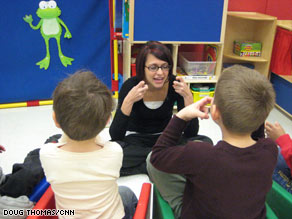
By Judy Fortin
CNN Medical Correspondent
ATLANTA, Georgia (CNN) -- A group of seven preschoolers gathered at a small table in the center of a brightly lit classroom and started playing with plastic blocks.
Their teacher, 27-year-old Stefanie Waldrop, sat in the middle of the group. She periodically asked the students what they were making. Some were unable to speak, others were squirming in their tiny chairs; several interrupted the playtime to use the bathroom.
The children, ages 2 to 5, have one thing in common: They all have autism.
"We come in here in the morning not knowing what the day's going to hold," said Waldrop, who teaches at the Marcus Autism Center in Atlanta. "We have to be really flexible about the stuff we do in the classroom."
Waldrop, who's been on the job for five years, is one of three certified special education teachers in the Center's Early Intervention Program.
Along with a group of assistants, the teachers spend the seven-hour school day moving from classroom to playroom to playground with 22 students who fall somewhere along the autism spectrum.
The American Academy of Pediatrics describes the autism spectrum as "a group of brain-based disorders that affect a child's behavior, social and communication skills."
The students at the Marcus Center are grouped not by age, but by their level of function. Waldrop is paired with children who have never received educational intervention before and have no readiness skills to transition to a public school. VideoWatch more on teaching children with autism »
In addition to helping the students learn to communicate, it's Waldrop's job to teach some of the basics, such as "going to the bathroom, washing hands...putting on their own socks and shoes, sitting in a chair without jumping up, and making eye contact." iReport.com: Have attitudes changed towards autism? Tell us about your experience
The job can be physically and emotionally demanding with a high burnout rate, according to Dr. Catherine Trapani, director of the education program at the Marcus Autism Center.
Waldrop used to work with older children who were profoundly and cognitively disabled, some of whom had serious aggression and behavior problems, Trapani said. "Stefanie was hurt. She was beaten up in the process of delivering her lessons and still came to work," said Trapani.
It helps that Waldrop loves children, but the right teacher for this job also has to be "reflective, outgoing, serious and silly," Trapani said.
"When you have to do the same thing 5,000 times and you're still not getting the response that you're looking for, if you can't see the humor in that or if you can't have a lighthearted moment, then you're going to be a very unhappy person," she said.
Waldrop admitted there are times when she gets frustrated. "There are lots of days that are very stressful and some days we come in first thing in the morning and we're not quite sure how we're going to make it to 3 o'clock," she said. Visit CNNhealth.com, your connection for better living
It helps to have three assistants in the classroom. "We play off of each other and can tell when someone is starting to get stressed out," she said. At that point, Waldrop said, it is time to take a break outside the classroom.
Waldrop doesn't use a lesson plan; rather, the work is organized in units. This month she's trying to teach the alphabet.
Trapani asks all the teachers she employs to focus on achieving one primary goal: "To develop skills to get children out of this setting and into community-based settings."
Waldrop said she worries that, in general, the public doesn't set very high expectations for children with autism. "People don't expect the kids to be able to do certain things," she said. "But if you work with them, most of our kids do pretty much anything that you can put in front of them."
But, she conceded, even conquering the basic milestones can take time. "When our kids learn how to do things that most people think are really easy -- like washing your hands -- that's exciting," Waldrop said. "It might take months for them to get it, but when they finally do, it is really exciting."
"We have kids who come in that are not able to talk at all and now can hold simple conversations," she said. "Knowing that you'll get there eventually is really gratifying."
Source: http://www.cnn.com/2009/HEALTH/03/30/hm.autism.teacher/
Please share this news with friends, family and also with your contact list on Facebook and MySpace.




No comments:
Post a Comment